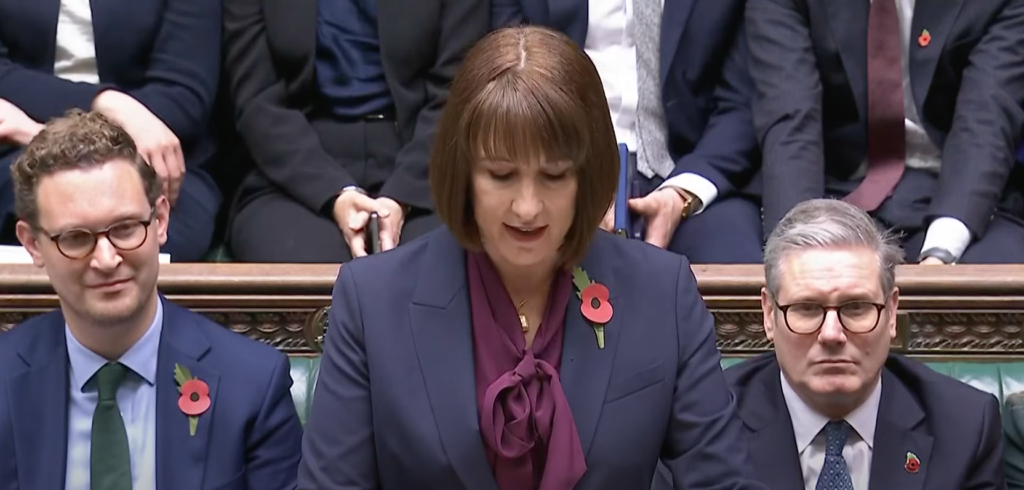Delivered by Chancellor Rahcel Reeves, the 2024 UK Budget marks a historic moment as the first Labour budget in over a decade. It will outline the key announcements that will shape the future of energy policy, costs, and sustainability in the UK. For millions of households already feeling the strain of rising energy bills, understanding the impact of these changes is essential. In this post, we’ll break down what the new Budget means for your energy bills, government support, and the nation’s path toward cleaner, greener energy.
What Is In The 2024 Budget?



1. Energy Prices and Household Bills
2% Inflation Target Maintained:
The government has reiterated its commitment to maintaining the inflation target at 2%, which is a positive signal for household budgets. This target, if achieved, could help stabilise energy prices, and protect consumers from dramatic price hikes.
Warm Homes Plan Expansion:
The Warm Homes Plan, aimed at making homes more energy-efficient, will receive additional funding. This provides grants for insulation, double glazing, and heating upgrades. These significantly lower energy bills by making homes more efficient. Households that qualify could see their energy expenses decrease significantly!
Windfall Tax on Oil and Gas Profits:
In a bid to fund new energy policies and address rising costs, the government has raised the windfall tax on oil and gas profits to 38%. This tax, coupled with the removal of the 29% investment allowance, means energy giants may face increased costs, which could impact energy prices. However, the government aims to use part of this revenue to directly support green energy initiatives that could reduce reliance on oil and gas, ultimately benefiting consumers.
2. Investments in Green Energy and Job Creation
GB Energy:
A cornerstone of the budget is the commitment to establishing GB Energy in Aberdeen with a massive £100 billion investment over the next five years. This will fund 11 green hydrogen projects across England, Scotland, and Wales, as part of the government’s pledge to make Britain a “clean energy superpower.” By boosting the UK’s renewable energy output, the government aims to make cleaner energy more accessible. By doing so, the UK will get closer to its net-zero targets, enhance its energy security, and reduce consumer bills as renewable sources become a larger part of the national grid.
The government is committed to “making Britain a clean energy superpower”
Chancellor Rachel Reeves
Green Job Creation:
Job creation in green energy is one of the government’s seven spending priorities. This could lead to thousands of new jobs in renewable energy sectors, from solar and wind to green hydrogen production. Households are likely to see a boost in regions where energy projects are set up, further stimulating local economies.
Electric Vehicle (EV) Incentives:
The government will continue to offer incentives for electric vehicle (EV) purchases, with a goal of raising £400 million by the end of the forecast period. By encouraging EV adoption, the government is targeting a reduction in fossil fuel demand, which could indirectly lower energy prices by reducing the overall reliance on oil and gas in the UK.
3. Cost-of-Living Support
National Minimum Wage:
To address cost-of-living challenges, the National Minimum Wage will rise to £12.21. This boost is aimed at helping low-income households manage essential costs, including energy bills, which remain a significant expense for many.
Household Support Fund:
An additional £1 billion will be injected into the Household Support Fund to help with the cost of essentials, including energy bills, food, and household expenses. This fund is designed for the most vulnerable households, providing short-term financial support that can ease the strain of rising energy costs.
Universal Credit Adjustments:
For the 1.2 million receiving Universal Credit, the reduction in repayment rates will allow recipients to retain an extra £420 a year on average. This change will help low-income families keep more of their benefits, providing additional financial flexibility to cover energy and other essential costs, so that they don’t have to make the difficult choice between heating and eating.
4. Fuel Duty and Travel Costs
Fuel Duty:
While the 5p fuel duty cut will be reversed, fuel duty will be frozen at current rates. This is a positive outcome for those reliant on cars, as fuel prices should remain stable at the pump, particularly important in rural areas with fewer public transport options. This means that for the next year, drivers can rest assured that fuel duty won’t be another bill increase.
Air Passenger Duty:
To fund new policies, the government is increasing the air passenger duty on private jets by 50%. This increase is part of an effort to offset carbon emissions from high-polluting modes of travel. Instead, the budget outlines incentives for eco-friendly travel.
5. Tax Reforms
Tax Increases For Specific Groups:
To support new spending on energy and cost-of-living programs, Labour has chosen to increase taxes in targeted areas. For instance, stamp duty will rise to 5% from 2%, impacting home purchases in certain brackets. Additionally, the freeze on inheritance tax until 2030 will generate further revenue without adding to the tax burden of working families.
Taxation For Workers:
No Increases in VAT, National Insurance, or Income Tax has been promised in the budget. The government is committed to protecting working households from tax increases. This approach is intended to allow workers to retain more of their income, helping them manage energy and other household costs without the added pressure of increased taxation on their earnings.
Summary And Ongoing Support
The 2024 Budget brings a wide range of reforms aimed at stabilising energy prices and boosting green initiatives, while introducing cost-of-living support measures to alleviate financial pressures on households. With increases in funding for the Warm Homes Plan, the establishment of GB Energy, and new tax policies aimed at wealthier sectors, this budget demonstrates Labour’s commitment to reshaping the UK’s energy landscape and easing financial pressures on households across the UK.
The next few months will see the budget proposals come into action. In the meantime, there is ongoing government-backed support available for households struggling with their energy bills. Qualifying households receive a package of measures, installed completely free of charge.
The average household saves hundreds off their energy bills every year with these measures. To see if you’re eligible and find out more, simply click the button above.



